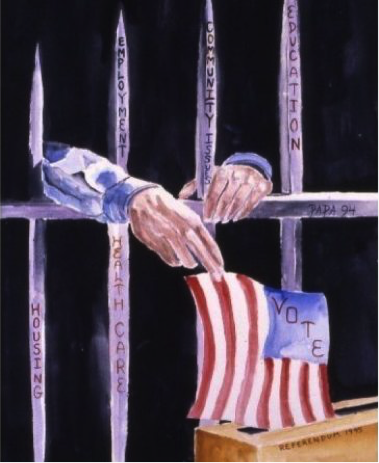
The Alien Tort Statute and Beyond: Jurisdiction for Victims of International Human Rights Abuses in U.S. Courts
October 26, 2018Archives . Authors . Blog News . Certified Review . Feature . Feature Img . Recent Stories . Student Blogs ArticleIn 2002, Nigerian nationals who had been granted asylum in the U.S. sued Dutch and British oil companies in the Southern District of New York. Specifically, the plaintiffs accused the companies of aiding and abetting the Nigerian government in carrying out environmental damage and human rights abuses. During the mid-1990’s, oil accounted for 95% of the Nigeria’s

Industrial Design: Reinterpreting the Useful Article Doctrine
October 26, 2018Archives . Authors . Blog News . Certified Review . Feature . Feature Img . Recent Stories . Student Blogs ArticleThe separability test’s current binary approach dooms opposing parties to talk past one another, each at a different level of abstraction, with courts only clumsily able to direct the proceedings. Courts could more productively channel discourse if they considered separability across a spectrum. By applying a spectrum, courts would be able to determine the sorts of designs that are truly worthy of copyright protection with greater precision and sophistication.

Arguing Over Arbitrability of an Arbitration Agreement: New Prime v. Oliveira and Its Potential Impact on the Transportation Industry
October 26, 2018Archives . Authors . Blog News . Certified Review . Feature . Feature Img . Recent Stories . Student Blogs ArticleIt has been reported that during the oral hearings that Justices with both conservative and liberal leanings expressed a predisposition to side with the worker. Hopefully the Court will also balance the policy implications and consider the potentially huge costs to the American consumer in arriving at its decision.

The Future is Female?: The Legal Implications of California’s New Law Mandating Female Representation on Corporate Boards
October 17, 2018Archives . Authors . Blog News . Certified Review . Feature . Feature Img . Recent Stories . Student Blogs ArticleWith women comprising over half the population, their insight is critical to discussions and decisions that affect corporate culture, actions and profitability. Women have different life experiences and perspectives than white men who typically comprise boards, and that makes a difference. Quotas may force companies to look outside of the normal places for diverse yet highly qualified candidates who might not have the typical background for such a position.

The School-to-Prison Pipeline and How It Can Stop Once We Put an End to Zero-Tolerance Policies
October 16, 2018Archives . Authors . Blog News . Certified Review . Feature . Feature Img . Recent Stories . Student Blogs ArticleThe zero-tolerance policies and use of police officers on school grounds are deeply failing our students.

A Case for Treating Nonviolent Drug Offenders With Rehabilitation Instead of Prison Time
October 4, 2018Archives . Authors . Blog News . Certified Review . Feature . Feature Img . Recent Stories . Student Blogs ArticleIn light of the opioid crisis facing the nation today, lawmakers are focusing less on harsh federal sentences, and more on research into the public health crisis. Since the government is looking at opioid drug users with more compassion and less contempt, there is a perfect opportunity for lawmakers to make offenders of all drugs an offense that calls for treatment instead of prison time.

Addressing the E-pidemic: Regulating Teen and Young Adult Use of Electronic Cigarettes
October 4, 2018Archives . Authors . Blog News . Certified Review . Feature . Feature Img . Recent Stories . Student Blogs ArticleIf these brands fail to appropriately address the epidemic of youth e-cigarette use, they are likely to receive harsh consequences from the FDA, including complete removal of some or all of their flavored products that may be contributing to the rise in youth use from the market until they otherwise meet all of their obligations under the law.

Guise of Belief: Acquiring Religious Accommodations with an Invented Religion and a Veil of Religious Sincerity
September 25, 2018Archives . Authors . Blog News . Certified Review . Feature . Feature Img . Recent Stories . Student Blogs ArticleIs there any way for a jury or judge to see past a sufficiently sophisticated farce? For now, we’ll have to hope that invented religions stick to humor and forgo genuine dedication to acquiring religious accommodations through an elaborate ruse.

Getting the Elephant out of the Room: A Needed Update to the Animal Welfare Act’s Humaneness Requirement as a Prohibition of Elephant Captivity in Zoos
September 22, 2018Archives . Authors . Blog News . Certified Review . Feature . Feature Img . Recent Stories . Student Blogs ArticleThe best solution for elephants currently suffering in zoos is to move them to elephant sanctuaries. A chorus of public and institutional support already exists for getting elephants out of zoos.

Voting Rights for the Incarcerated
September 22, 2018Archives . Authors . Blog News . Certified Review . Feature . Feature Img . Recent Stories . Student Blogs ArticleThese stunning statistics do not just affect policy implications for racial subjugation but also proper rehabilitation of ex-felons into normal society.